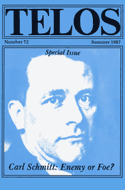By Ryan Holston · Friday, January 12, 2018 Ryan Holston’s “Deliberation in Context: Reexamining the Confrontation between the Discourse Ethics and Neo-Aristotelianism” appears in Telos 181 (Winter 2017). Read the full article at the Telos Online website, or purchase a print copy of the issue in our online store. Individual subscriptions to Telos are now available in both print and online formats.
Deliberative democrats continue to emphasize universal justification as the key criterion for establishing political legitimacy within pluralistic democracies. However, this essay argues that their refusal to acknowledge the limits to mutual appeal posed by the scale of the ethical life (Sittlichkeit) is utopian. Moreover, the cost of such utopianism is the failure to acknowledge the vital role of a sensus communis for meaningful deliberation. Drawing on the work of Hans-Georg Gadamer, this essay aims to combat the abstraction that has characterized much of the recent debate over deliberation.
Continue reading →
By Linas Jokubaitis · Tuesday, January 28, 2014 As an occasional feature on TELOSscope, we highlight a past Telos article whose critical insights continue to illuminate our thinking and challenge our assumptions. Today, Linas Jokubaitis looks at Carl Schmitt’s “The Legal World Revolution” from Telos 72 (Summer 1987).
 Carl Schmitt wrote “The Legal World Revolution” when he was ninety years old, and it turned out to have been his last publication. New political developments had forced him to restate some of his old positions, the most important of which was the relationship between legitimacy, legality, and super-legality. The guiding theme of Schmitt’s final publication was the one that had been of the highest importance during his whole career. It is best summarized in notes posthumously published as Glossarium, in a passage entitled “The Diagnostic and Prognostic of Max Weber,” where Schmitt quoted from Weber’s “Sociology of Law”: “As a result of technical and economic development, it is inevitable that current law is destined to be conceived more and more as a rational technical mechanism which can be modified at any time for functional purposes, and is lacking in any kind of sacred content. The destiny may be hidden by the suppleness of belief of the current law, but cannot be truly avoided.” Carl Schmitt wrote “The Legal World Revolution” when he was ninety years old, and it turned out to have been his last publication. New political developments had forced him to restate some of his old positions, the most important of which was the relationship between legitimacy, legality, and super-legality. The guiding theme of Schmitt’s final publication was the one that had been of the highest importance during his whole career. It is best summarized in notes posthumously published as Glossarium, in a passage entitled “The Diagnostic and Prognostic of Max Weber,” where Schmitt quoted from Weber’s “Sociology of Law”: “As a result of technical and economic development, it is inevitable that current law is destined to be conceived more and more as a rational technical mechanism which can be modified at any time for functional purposes, and is lacking in any kind of sacred content. The destiny may be hidden by the suppleness of belief of the current law, but cannot be truly avoided.”
Continue reading →
|
|
 Carl Schmitt wrote “The Legal World Revolution” when he was ninety years old, and it turned out to have been his last publication. New political developments had forced him to restate some of his old positions, the most important of which was the relationship between legitimacy, legality, and super-legality. The guiding theme of Schmitt’s final publication was the one that had been of the highest importance during his whole career. It is best summarized in notes posthumously published as Glossarium, in a passage entitled “The Diagnostic and Prognostic of Max Weber,” where Schmitt quoted from Weber’s “Sociology of Law”: “As a result of technical and economic development, it is inevitable that current law is destined to be conceived more and more as a rational technical mechanism which can be modified at any time for functional purposes, and is lacking in any kind of sacred content. The destiny may be hidden by the suppleness of belief of the current law, but cannot be truly avoided.”
Carl Schmitt wrote “The Legal World Revolution” when he was ninety years old, and it turned out to have been his last publication. New political developments had forced him to restate some of his old positions, the most important of which was the relationship between legitimacy, legality, and super-legality. The guiding theme of Schmitt’s final publication was the one that had been of the highest importance during his whole career. It is best summarized in notes posthumously published as Glossarium, in a passage entitled “The Diagnostic and Prognostic of Max Weber,” where Schmitt quoted from Weber’s “Sociology of Law”: “As a result of technical and economic development, it is inevitable that current law is destined to be conceived more and more as a rational technical mechanism which can be modified at any time for functional purposes, and is lacking in any kind of sacred content. The destiny may be hidden by the suppleness of belief of the current law, but cannot be truly avoided.” 

